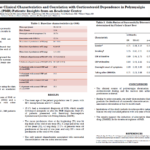An overview of highlights from the 2025 ECIM meeting, including research on treatment options for systemic sclerosis, the management of PMR & autoimmune testing.


An overview of highlights from the 2025 ECIM meeting, including research on treatment options for systemic sclerosis, the management of PMR & autoimmune testing.

Deborah Levenson |
Results of the international SELECT-GCA study suggest that upadacitinib may be an effective new oral treatment for giant cell arteritis.

Michael J. Cammarata, MD |
Reactive arthritis has proved to be a diagnostic & therapeutic challenge due to its diverse presentations.
Figueroa-Parra et al. set out to evaluate the effect of glucocorticoid regimens on renal response, infections and mortality rates among patients with lupus nephritis (LN). The researchers analyzed the control arms of randomized clinical trials and found a higher exposure to glucocorticoids during the initial treatment of LN was associated with better renal outcomes, at the cost of increased infections and mortality.

A Shift in Prescribing Patterns Safety issues prompt discontinuation of tofacitinib By Stephanie Song, MD, & Joshua F. Baker, MD, MSCE Why was this study done? The ORAL Surveillance study highlighted risks of cardiac events, thromboembolism (VTE) and malignancy associated with use of Janus kinase inhibitors (JAKi). We sought to determine the impact of safety…

Desh Nepal, MD, Sebastian E. Sattui, MD, MS, & Michael Putman, MD, MS |
Originally posted Feb. 13, 2023; reposted in conjunction with publication of the PMR supplement to the February 2024 issue of The Rheumatologist. PHILADELPHIA—Polymyalgia rheumatica (PMR) is a chronic inflammatory condition that almost exclusively affects individuals older than 50.1 First described in 1888, PMR has been a recognized rheumatic disease since at least 1957. Diagnosing the…

Katie Robinson |
A minority of patients with polymyalgia rheumatica (PMR) who were new to rheumatology practice were prescribed steroid-sparing agents through two years of follow-up. This is according to a large, U.S.-based cohort study, published in Arthritis Care & Research, which also found that nearly two-thirds of the patients remained on glucocorticoids beyond one year.1 “Our study…

Vivekanand Tiwari, MD, Emily Campbell, MD, Joshua Skydel, MD, Bryan Savage, MD, Monica Dimambro, Todd MacKenzie, PhD, & William F. Rigby, MD |
Background/Purpose Polymyalgia rheumatica (PMR) treatment is primarily based on long-term corticosteroids, which results in significant toxicities. Studies have shown that patients with PMR are exposed to years of corticosteroid treatment.1,2 In a single academic center cohort, we found that 76% of patients remained on steroids at the end of two years.3 In a second cohort…

BALTIMORE—2022 was an exciting year in the field of vasculitis, not least of all because the ACR and EULAR released classification criteria for several forms. This development came just one year after the release of ACR/Vasculitis Foundation (VF) guidelines on the management of a number of vasculitides. With so much new information to be absorbed,…

David S. Pisetsky, MD, PhD |
The historical & continuing roles of glucocorticoids in the treatment of RA are discussed.